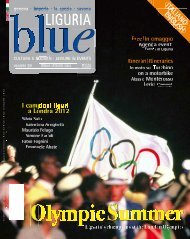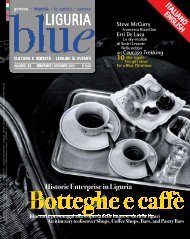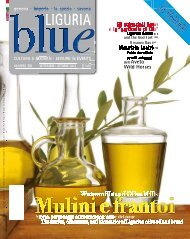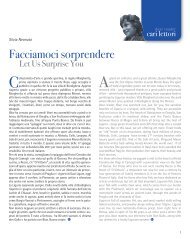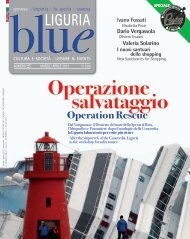Download PDF - Blue Liguria - Sagep
Download PDF - Blue Liguria - Sagep
Download PDF - Blue Liguria - Sagep
You also want an ePaper? Increase the reach of your titles
YUMPU automatically turns print PDFs into web optimized ePapers that Google loves.
lue<br />
cover<br />
Intellettuali in Riviera<br />
American Intellectuals in <strong>Liguria</strong><br />
Per Melville Genova era l’accampamento di Satana, mentre Twain scherzava sulla bellezza delle donne liguri e James visitava il Golfo<br />
della Spezia. Molti ospiti illustri anche nel ’900: Mary McCarthy trascorreva le estati a Bocca di Magra, Hemigway andava a trovare<br />
Pound a Rapallo dove arrivarono poi anche Antheil e Ginsberg. E il Nobel Derek Walcott ha reso omaggio a Colombo a Genova<br />
For Melville, the author of Moby Dick, Genoa was Satan’s capital, while Mark Twain joked about the beauty of<br />
<strong>Liguria</strong>n women, and Henry James went to pay homage to Shelley’s last residence in the Gulf of Spezia. Hemingway<br />
who came to see Ezra Pound in Rapallo. He was followed by many other poets, among them James Laughlin, Robert<br />
Lowell, and Allen Ginsberg. Nobel Prize winner Derek Walcott also paid homage to Columbus and Genoa<br />
Massimo Bacigalupo<br />
ha dato tre cose al mondo: la<br />
Banca, il Pesto e... l’America». È una battuta<br />
che non manca mai di divertire i vi-<br />
«Genova<br />
sitatori stranieri, e in cui c’è pure un pizzico di verità.<br />
Per converso, l’America ha continuato a essere<br />
presente in <strong>Liguria</strong> attraverso una lunga serie di<br />
viaggiatori in vacanza o alla ricerca di ozi letterari,<br />
per non dire dei liguri numerosissimi che hanno attraversato<br />
l’Atlantico per lavoro o studio, spesso ritornando<br />
e (come accadeva nei primi anni del ’900)<br />
costruendo le loro ville di “americani” con i frutti<br />
dei loro onesti traffici, o elevando in quasi tutte le<br />
cittadine rivierasche monumenti a Colombo.<br />
Fra i tanti ospiti americani in <strong>Liguria</strong>, più o meno<br />
stanziali, non mancano gli scrittori di prima grandezza.<br />
Una targa a piazza Caricamento ricorda<br />
l’antico Hotel Croce di Malta, in cui soggiornarono<br />
gli americani James Fenimore Cooper (1828),<br />
William Dean Howells (1864), Mark Twain<br />
(1869) e Henry James (1877), tutti per brevi soste<br />
che però hanno lasciato traccia nelle loro pagine,<br />
come fu per quella di Herman Melville nel<br />
vicino Hotel Feder (1857).<br />
All’accigliato creatore di Moby-Dick Genova<br />
sembrava «la capitale e l’accampamento fortificato<br />
di Satana, fortificato contro gli Arcangeli»<br />
«the capital and fortified camp of Satan». I veli<br />
del copricapo tradizionale delle genovesi parevano<br />
a Melville «una ricetta per far sembrare avvenente<br />
una donna brutta».<br />
Ci vorrà l’impagabile Mark Twain per sdilinquirsi<br />
umoristicamente sulle maliose genovesi: «Osservai<br />
ogni volto femminile che passava, e mi parvero<br />
has given three things to the<br />
world: banking, Pesto, and—America.” A<br />
“Genoa<br />
witty statement that never fails to<br />
amuse foreign visitors, in which, besides, there is a<br />
pinch of truth. Conversely, America has continued<br />
to be present in <strong>Liguria</strong> through a long series of<br />
voyagers on vacation or in search of literary<br />
pleasures, not to mention the many <strong>Liguria</strong>ns who<br />
have crossed the Atlantic for work or for study,<br />
often returning (as frequently happened in the early<br />
1900s) to build their “American” villas with the<br />
fruit of their honest labors, or to erect, in almost all<br />
the towns of the Riviera, a monument to<br />
Christopher Columbus, for showing them the way.<br />
Among the many American visitors to <strong>Liguria</strong> who<br />
came for fairly prolonged stays, great writers<br />
abound. A plaque on Piazza Caricamento, Genoa,<br />
commemorates the Hotel Croce di Malta, in which<br />
James Fenimore Cooper (1828), William Dean<br />
Howells (1864), Mark Twain (1869) and Henry<br />
James (1877) all stayed briefly, and wrote about it<br />
in their journals.<br />
So did Herman Melville, who stayed in the<br />
nearby Hotel Feder (1857). To the sullen creator of<br />
“Moby-Dick”, Genoa seemed “the capital and<br />
fortified camp of Satan, fortified against the<br />
Archangels”. The traditional veils of the Genoese<br />
ladies were, for Melville, “a recipe to try to make an<br />
ugly woman attractive”.<br />
Mark Twain, on the other hand, was enthusiastic<br />
about the enchanting Genoese ladies. “I scanned<br />
every female face that passed, and it seemed to me<br />
that all were handsome. I never saw such a freshet<br />
62



